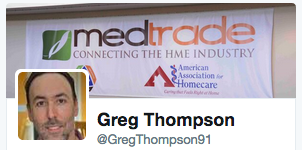FRESNO, CA – Ted Jones, president and CEO of Business Flow (BFLOW™), Fresno, California, wants his prospective customers to know that there is a big difference between billing software and business management software. “Billing software allows you to create a 1500 claim form and transmit it to a clearinghouse in an EDI format,” Jones says. “That’s pretty much all it will do for you.”
Business management software, however, is a sophisticated tool, and according to Jones: “It should think, react, and steer activities of the business by notifying and reordering inventory that is low, reporting to you when claims are not being paid, or if a backlog exists in the cash pipeline.”
 BFLOW™ is a software as a service (SaaS) DME billing software and DME business management solution—built from scratch and designed with the entire business in mind. The six-year-old company has grown steadily thanks to Jones and his team’s ability to respond to customer demands. Medtrade Monday chatted with Jones to get his views on what it takes to succeed in the competitive world of business software, the scourge of competitive bidding, and the origins of BFLOW.
BFLOW™ is a software as a service (SaaS) DME billing software and DME business management solution—built from scratch and designed with the entire business in mind. The six-year-old company has grown steadily thanks to Jones and his team’s ability to respond to customer demands. Medtrade Monday chatted with Jones to get his views on what it takes to succeed in the competitive world of business software, the scourge of competitive bidding, and the origins of BFLOW.
Medtrade Monday: Why is billing software so important in today’s DME world?
Ted Jones, president and CEO, Business Flow (BFLOW™), Fresno, California: Billing software isn’t important at all. Business management software for DME business is critical. There are huge differences between billing software and business management software, and most people don’t understand that yet. Billing software allows you to create a 1500 claim form and transmit it to a clearinghouse in an EDI format. That’s pretty much all it will do for you, and for some DME owners that’s enough.
Medtrade Monday: What does good business management software do for providers?
Jones: Business management software allows for the capture of electronic signatures at the time of delivery, emails patient education materials, and deals with relationship management of patients, vendors, manufacturers, doctors, and referral sources. Billing software can’t do these things, and the future of the post-acute world lies in business management solutions that take the best parts of software like Salesforce, Hubspot, Quickbooks, Shopify, online banking, electronic medical and health records, and telehealth—and melds them into a new kind of business management software for the management of the unique complexity of post-acute businesses.
Medtrade Monday: How was your Medtrade Spring 2018 experience in Las Vegas, and why have you decided to exhibit at Medtrade in Atlanta, scheduled for Oct 15-17, 2018?
Jones: Medtrade Spring was very rewarding, and our expectations were exceeded by the reception we received from the many business leaders we had the honor to meet there. Putting faces to names, meeting new and experienced business leaders for the first time, and sharing our incredible application with everyone was fun and exciting.
 In Las Vegas we were met with a seemingly unending wave of visitors to our modest booth. We really “crushed it.” I’ve done shows in the past for other companies I owned and never got that kind of reception. By the end of the first day, we nearly ran out of the “Swag” we were giving away to folks who demoed the software. After the show, our neighboring exhibitors commented on how much traffic we received. They were congratulating us on how they thought we did there. Most kept asking where we came from and how we got that kind of traffic, since they never saw us at Medtrade before. Seven companies decided to “go with the flow” at the show by signing multi-year contracts with us for the software and or our revenue cycle management services.
In Las Vegas we were met with a seemingly unending wave of visitors to our modest booth. We really “crushed it.” I’ve done shows in the past for other companies I owned and never got that kind of reception. By the end of the first day, we nearly ran out of the “Swag” we were giving away to folks who demoed the software. After the show, our neighboring exhibitors commented on how much traffic we received. They were congratulating us on how they thought we did there. Most kept asking where we came from and how we got that kind of traffic, since they never saw us at Medtrade before. Seven companies decided to “go with the flow” at the show by signing multi-year contracts with us for the software and or our revenue cycle management services.
We plan to continue the wave of energy from the Las Vegas show and ride it to the Atlanta show. We have some surprises in store for business leaders, and we plan to reveal those in Atlanta. We also committed to a larger booth to accommodate the traffic and allow our guests a place to comfortably demo the software and assist business leaders on their buying journey.
Medtrade Monday: What are the origins of your company?
Jones: I have to thank my mother, Helen Jones, a retired elementary school teacher, as well as my late father, Ted Jones, Sr., a banker, for blessing me with a Commodore 64 computer one christmas when I was about 11 years old. That gift opened my eyes to the possibilities of software engineering. Fast forward 25 years, I founded BFLOW Solutions Inc. in 2010. and today we have employed over 30 software engineers and developed a strong team of subject matter experts who provide billing training, customer support, and consulting services.
Medtrade Monday: How did you get into the DME side of software?
Jones: Although I did not pursue a career in engineering, I received my degree in health science with an emphasis in healthcare administration, and eventually opened my own DMEs after I had enough of corporate America. When accreditation hit the scene in 2005, I started my consultancy, helping DME owners in nearly every state to earn their accreditation. That’s when I saw the need for intuitive software for managing billing, accounting, inventory, and compliance. I’d say BFLOW was born out of a desire to create something new that would revolutionize the industry, rather than just be another boring software, which at the time were nothing more than glorified typewriters used to fill out a 1500 claim form.
Medtrade Monday: How has the competitive bidding program affected your product and its features?
Jones: Competitive bidding is stupid. We shouldn’t be bidding on the quality of care we need. The concept of giving the lowest bidder the job is a recipe for disaster. A great example is the pedestrian bridge that collapsed near Florida International University in March of this year. We don’t need the lowest bidders to win big contracts; we need safe, quality services and free market competition to promote better health and wellbeing for patients.
Competitive bidding has caused us to build out enhancements to our fee schedule management app, scheduling, contract management, and patient CRM. We added new business logic, zip code rules, MSA rules, rural pricing rules, and I’ll tell you, it’s all a waste of time and energy for everybody. I don’t recall doctors, hospitals, clinics, home health agencies. or skilled nursing facilities having to bid on anything to do business with CMS.
The system is creating an atmosphere of delayed care, treatment and services. Bid winners can’t keep up with the volume of orders, and they are literally giving away product as a result, because they can’t bill for what they delivered due to lack of qualifying information from ordering physicians. That’s how CMS is saving—by cheating the DME business leader, threatening criminal action, and funding recoupments if they get it wrong. It’s too much pressure, and eventually it’s going to break.


